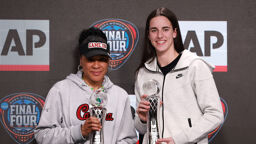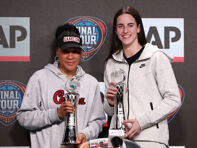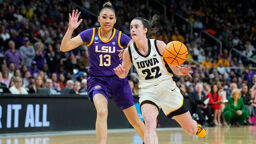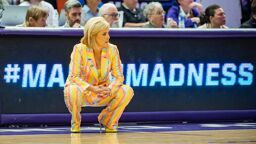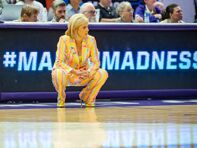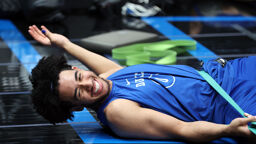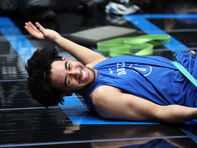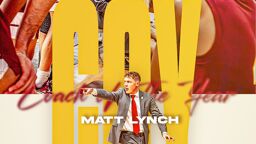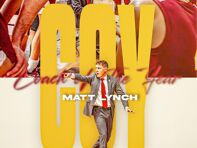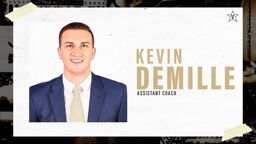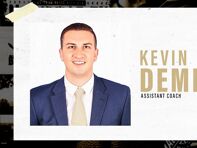I was sitting in my boss’s office with my feet shaking and heart racing.
I had put in a full day’s worth of work on a hot day in June on the campus of Texas A&M University-Kingsville and women’s basketball coach Wade Scott told me, his only assistant, I could leave for the day. But the problem was, I wasn’t ready to.
For the past 30 minutes, I was nervously stamping my feet trying to get the courage to tell him what I had avoided for so long.
I’m gay.
I grew up in rural America, in Warrensburg, Missouri, home of the University of Central Missouri Jennies and Mules, about 40 minutes outside of Kansas City,
It was a normal upbringing, living with my parents, two sisters and surrounded by friends and family. It was everything you’d think small town central Missouri to be. I have always been close with my family, but for years I didn’t have the courage to tell them my secret.
Born and raised a coach’s kid, I’ve idolized my dad, a head collegiate women’s basketball coach, since I was born. He and my mom, his assistant coach, brought me to a gym more often than the playground, but I couldn’t have asked for a better childhood growing up.
I spent countless hours in the gym from my early childhood, eventually leading me down the path of playing basketball. My hard work landed me a scholarship to one of the best Division II universities in the country — the University of Central Missouri. I was the hometown hero.
I played college basketball from 2008-12, with my team winning multiple conference championships. While many can’t see the end of their playing days, I was excited for mine, knowing I was headed to the coaching ranks upon graduation.
I had spent my whole life preparing to become a coach at the collegiate level. I got great grades, was a student of the game and knew what the true life of a coach was like.
I first realized I was gay during high school but my first, and only, instinct was to hide it.
But what a lot of people didn’t see was the struggle I faced with my homosexuality.
I first realized I was gay during high school but my first, and only, instinct was to hide it. I didn’t want anyone knowing who or what I was, or for it to ever get out that I “played for the other team.”

I didn’t want my teammates to think less of me and the thought of having to tell other 18- to 22-year-old straight men was a daunting task. The male ego in basketball is a blessing and a curse, and I did not want to become a distraction.
My college experience was different than most, in the fact that I never truly left home, so I just kept living the same way. I think my family and friends had always sensed I was holding onto a secret, and my sisters Brittney and Maggie tried to get me to open up about it during my senior year of college. But I denied it vehemently. They left it alone, even though they knew, and I continued to live that part of my life in secret.
I made it through college at Central Missouri and grad school at Indiana State without really ever having to face the reality of the secret I was hiding. I landed my first full-time job at the University of Missouri-St. Louis in 2015 before I arrived at Texas A&M University-Kingsville in August 2016.
Kingsville, in many ways, reminds of me Warrensburg. It’s a small town with conservative views, but just a tad closer to the Mexico border. I didn’t think that this place would be where I came out publicly for the first time, but here I am.
I never thought that I would make it in the sports world by coming out.
I never thought that I would make it in the sports world by coming out. I’d long dreamed of the societal norm of a wife, white picket fence, three kids and suburban life because that’s the life I grew up in. I saw how happy my family was and wanted that for my future family, but I knew deep down mine just couldn’t be the norm.
What changed my life was meeting a fellow coach at the Women’s Basketball Coaches Assn. convention in March. We struck up a quick friendship and he helped me join a group for coaches who are a part of the LGBTQ community.
As I explored how I could possibly come to terms with who I was and doing it in the coaching world, Anthony Nicodemo, another coach, became my support and I’m forever grateful for our friendship. He inspired me to go out on a limb by buying a ticket at the last minute and fly to Denver for the Outsports 2017 Reunion. It’s where I truly was able to be myself.
When I arrived at Denver, I was nervous, I was anxious, I was scared. Would I meet people like me, or was I just completely different?
I felt the love the moment I walked into the conference room with other LGBTQ people in sports. I discussed with many people who and what I was. I met and learned so many things about the LGBTQ community in sports.

I was not alone, and would not be alone moving forward, but the moment of clarity for me was when the Denver Pride parade was about to start.
I saw a young mother and her kids along the parade route supporting and cheering each person who walked by. I knew at that moment that I hadn’t been living my full authentic life. I wanted my nephew and family to be proud of who and what I am and will become. I am forever grateful to that family sitting on the curb cheering us on at the parade.
I was so moved by the weekend and ready to come out that I reached out to my family and finally told them the day I left Denver. The crazy part about it is I knew all along they just wanted me to be happy, but I just couldn’t muster the courage to say the words until then. They are my rocks and I am so grateful for their support.
I find coaching at the collegiate level intriguing for so many reasons, but the biggest is that it’s the age where a person is finding out who they are. I wish I would have had the courage to come out while I was playing, but that’s part of the story I want to pass on to others.
I am now living my authentic life. I don’t have to sneak around or hide that part of my life anymore. I believe that not coming out hampered me not only as a basketball player and a basketball coach, but also the growth of me as a person.
In the short time since mid-June, I’ve had my players, co-workers, friends and family comment on the changes they’ve seen in my personality since coming out.
I have always been an X’s and O’s kind of guy, but I have found that the connectiveness with my athletes is where I was lacking. You must be authentic and true for them to not only see you, but believe you. I wasn’t before and the girls saw through it. I could tell there was a bit of a disconnect, but that disconnect wasn’t their fault; it was my own.
I believe that coming out will help propel me to become not just a good coach, but a great coach.
I needed to be confident in who I am and who I am becoming. We have a current player on our team who is fighting the battle of who she is and what she wants to become in her life. How could I possibly help, if I wasn’t being true to myself? This player was a huge reason as to why I came out, and I knew she wouldn’t be my last player to struggle.
I want everyone who battles the struggle of who they are to know that it will be all right, and that you should be proud of who you are. I believe that coming out will help propel me to become not just a good coach, but a great coach.

You might be wondering what happened when I told my boss I was gay?
Wade was the man I was the most nervous to tell, because of the stereotypes I had created in my head. He’s a true Southerner, conservative and not afraid to speak his mind. He is a brash, tough man who is blue-collar all the way, which I appreciate. I felt my telling him could go either well or badly.
As I sat there, all I could think was how this could change my life and my relationship with everyone. He knew I had gone to Denver the previous weekend but was not for sure why. I told him I attended the Outsports event and Pride weekend and I was finally ready to live my life the way I wanted to.
His response will always be ingrained in my head: “Oh shit, I hope I haven’t said something bad or offensive.”
I laughed with a huge sense of relief and told him he hasn’t said one thing that has remotely offended me. His next line is what resonated with the most though: “I couldn’t care less if you like men, as long as you do your job.”
It was the best response anyone could have ever said to me. This rough, tough man who was raised in the South was the most accepting I could have ever asked for. At that point, I knew I made the right decision not only to come out, but to do it here in south Texas.
DJ Slifer is the assistant coach at Texas A&M-Kingsville and former college basketball player at Central Missouri. He can be reached via email ([email protected]) or on Twitter (@djslifer10), Instagram (@djslifer) and Facebook.
Story editor: Jim Buzinski



